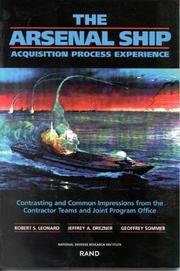| Listing 1 - 10 of 14 | << page >> |
Sort by
|


ISBN: 0833027271 0833043404 0585247676 9780585247670 9780833043405 9780833027276 Year: 1999 Publisher: Santa Monica, CA : Rand,
Abstract | Keywords | Export | Availability | Bookmark
 Loading...
Loading...Choose an application
- Reference Manager
- EndNote
- RefWorks (Direct export to RefWorks)
Computer crimes -- Costs. --- Data protection -- Costs. --- High technology industries -- Security measures -- Costs. --- Computer crimes --- Data protection --- High technology industries --- Social Welfare & Social Work --- Social Sciences --- Criminology, Penology & Juvenile Delinquency --- Costs --- Security measures --- Costs. --- Data governance --- Data regulation --- Personal data protection --- Protection, Data --- Computers and crime --- Cyber crimes --- Cybercrimes --- Electronic crimes (Computer crimes) --- Internet crimes --- Industries --- Electronic data processing --- Crime --- Privacy, Right of

ISBN: 1282737147 9786612737145 0080505961 0884152286 9780884152286 9780080505961 9781282737143 661273714X Year: 1999 Publisher: Houston, TX Gulf Professional Pub.
Abstract | Keywords | Export | Availability | Bookmark
 Loading...
Loading...Choose an application
- Reference Manager
- EndNote
- RefWorks (Direct export to RefWorks)
This manual's latest edition continues to be the best source available for making accurate, reliable man-hour estimates for electrical installation. This new edition is revised and expanded to include installation of electrical instrumentation, which is used in monitoring various process systems.
Electric engineering - Estimates. --- Electric engineering --Estimates. --- Electrical engineering - Estimates. --- Electrical engineering --- Electrical & Computer Engineering --- Engineering & Applied Sciences --- Electrical Engineering --- Estimates --- Engineering --- Estimates. --- Estimates and costs

ISBN: 1281046736 9786611046736 0080505007 0124441653 9780124441651 9780080505008 9781281046734 Year: 1999 Publisher: San Diego Academic Press
Abstract | Keywords | Export | Availability | Bookmark
 Loading...
Loading...Choose an application
- Reference Manager
- EndNote
- RefWorks (Direct export to RefWorks)
Economic Risk in Hydrocarbon Exploration provides a total framework for assessing the uncertainties associated with exploration risk from beginning to end. Numerous examples with accompanying microcomputer algorithms illustrate how to quantitatively approach economic risk. The text compares detailed assumptions and models of economic risk, and presents numerical examples throughout to facilitate hands-on calculations using popular spread-sheet packages on personal computers.Key Features* Covers economic risk from exploration through production models* Brings methods to a
Petroleum industry and trade --- Prospecting --- Risk --- Finance --- Mathematical models. --- Costs --- Exploration (Prospecting) --- Mines and mineral resources --- Mine examination --- Mine valuation --- Energy industries --- Oil industries


ISBN: 0585243492 9780585243498 0833026909 9780833026903 Year: 1999 Publisher: Santa Monica, CA : RAND,
Abstract | Keywords | Export | Availability | Bookmark
 Loading...
Loading...Choose an application
- Reference Manager
- EndNote
- RefWorks (Direct export to RefWorks)
The Arsenal Ship acquisition program was unique in two respects: it represented a new operational concept for Navy weapon systems, and its management structure and process represented a significant departure from traditional military ship-building programs. The Arsenal Ship program was, in effect, an experiment; while the Navy envisioned an array of mission capabilities for the ship, it set the project budget as the single immovable requirement. In the end, political and financial constraints caused the program's cancellation. Nevertheless, its acquisition approach and technical innovations have already had--and will continue to have--significant influence on other Navy ship-building programs. The lessons learned from the Arsenal Ship program, applied to existing and planned systems, should more than recover the money spent on it.
Warships --- Shipbuilding --- Naval ships --- War-ships --- Government vessels --- Naval architecture --- Ships --- Armored vessels --- Navies --- Design and construction. --- United States. --- U.S. Navy --- Procurement. --- Weapons systems --- Costs.

ISBN: 030906080X 0309524164 0585090076 9780585090078 9780309060806 0309086701 9780309086707 030506080X 9780309524162 0309173558 Year: 1999 Publisher: Washington, D.C. : National Academy Press,
Abstract | Keywords | Export | Availability | Bookmark
 Loading...
Loading...Choose an application
- Reference Manager
- EndNote
- RefWorks (Direct export to RefWorks)
Aerospace industries -- United States -- Costs -- Congresses. --- Industrial procurement -- United States -- Congresses. --- Offset (Accounting) -- Congresses. --- Aerospace industries --- Industrial procurement --- Offset (Accounting) --- Industries --- Business & Economics --- Costs --- Offset accounts --- Buyer-supplier relations --- Buying, Industrial --- Industrial buying --- Industrial equipment --- Industrial purchasing --- Procurement, Industrial --- Purchasing, Industrial --- Supplier-buyer relations --- Purchasing --- Accounting --- Industrial management

ISBN: 0674009436 0674020901 9780674020900 0674952413 9780674009431 9780674952416 9780674009431 Year: 1999 Publisher: Cambridge, Mass. Harvard University Press
Abstract | Keywords | Export | Availability | Bookmark
 Loading...
Loading...Choose an application
- Reference Manager
- EndNote
- RefWorks (Direct export to RefWorks)
A deep question in economics is why wages and salaries don't fall during recessions. This is not true of other prices, which adjust relatively quickly to reflect changes in demand and supply. Although economists have posited many theories to account for wage rigidity, none is satisfactory. Eschewing "top-down" theorizing, Truman Bewley explored the puzzle by interviewing--during the recession of the early 1990s--over three hundred business executives and labor leaders as well as professional recruiters and advisors to the unemployed. By taking this approach, gaining the confidence of his interlocutors and asking them detailed questions in a nonstructured way, he was able to uncover empirically the circumstances that give rise to wage rigidity. He found that the executives were averse to cutting wages of either current employees or new hires, even during the economic downturn when demand for their products fell sharply. They believed that cutting wages would hurt morale, which they felt was critical in gaining the cooperation of their employees and in convincing them to internalize the managers' objectives for the company. Bewley's findings contradict most theories of wage rigidity and provide fascinating insights into the problems businesses face that prevent labor markets from clearing.Table of Contents: Acknowledgments 1. Introduction 2. Methods 3. Time and Location 4. Morale 5. Company Risk Aversion 6. Internal Pay Structure 7. External Pay Structure 8. The Shirking Theory 9. The Pay of New Hires in the Primary Sector 10. Raises 11. Resistance to Pay Reduction 12. Experiences with Pay Reduction 13. Layoffs 14. Severance Benefits 15. Hiring 16. Voluntary Turnover 17. The Secondary Sector 18. The Unemployed 19. Information, Wage Rigidity, and Labor Negotiations 20. Existing Theories 21. Remarks on Theory 22. Whereto from Here? Notes References Index Reviews of this book: In Why Wages Don't Fall During A Recession, [Truman Bewley] tackles one of the oldest, and most controversial, puzzles in economics: why nominal wages rarely fall (and real wages do not fall enough) when unemployment is high. But he does so in a novel way, through interviews with over 300 businessmen, union leaders, job recruiters and unemployment counsellors in the north-eastern United States during the early 1990s recession.Mr. Bewley concludes that employers resist pay cuts largely because the savings from lower wages are usually outweighed by the cost of denting workers' morale: pay cuts hit workers' standard of living and lower their self-esteem. Falling morale raises staff turnover and reduces productivity.Mr. Bewley's theory has some interesting implications.[and] has a ring of truth to it.--The EconomistReviews of this book: This contribution to the growing literature on behavioral macroeconomics threatens to disturb the tranquil state of macroeconomic theory that has prevailed in recent years.Bewley's argument will be hard for conventional macroeconomists to ignore, partly because of the extraordinary thoroughness and honesty with which he evidently conducted his investigation, and the sheer volume of evidence he provides.Although Bewley's work will not settle the substantive debates related to wage rigidity, it is likely to have a profound influence on the way macroeconomists construct models. In particular, the concepts of morale, fairness, and money illusion are almost certain to play a big role in macroeconomic theory. His demonstration that there exist in reality simple, robust behavioral patters that cannot plausibly be founded on traditional maximizing behabior also raises the prospect of a more empirically oriented, more behavioral macroeconomics in the future.--Peter Howitt, journal of Economic LiteratureReviews of this book: I think any scholar interested in labour markets and wage determination should read this well-written, lively, and highly stimulating book.[It] provides a fresh view and a lot of complementary background knowledge about how experienced people in the field see the employment relationship and what is actually crucial. Knowledge of this sort is all too rare in economics, and Truman Bewley's truly impressive study can serve as a role model for future investigations.--Simon G'chter, Journal of Institutional and Theoretical EconomicsTo call this book a breath of fresh air is an understatement. The direct insights are fascinating, and Truman Bewley's use of them is sharp and insightful. Labor economists and macroeconomists have a lot to think about.--Robert M. Solow, Nobel Laureate, Institute Professor of Economics, Emeritus, Massachusetts Institute of TechnologyTruman Bewley set out to conduct a handful of interviews with business executives to gain some theoretical inspiration, and his project blossomed into over 300 interviews with business people, labor leaders and consultants. He is truly the accidental interviewer of economics. Time and again, he found that workers behave like people, not atomistic, selfish economic agents. His insights will engage and enrage economic theorists and empiricists for years to come.--Alan Krueger, Bendheim Professor of Economics and Public Affairs, Princeton University
Wages. --- Recessions. --- Labor supply. --- Labor force --- Labor force participation --- Labor pool --- Work force --- Workforce --- Compensation --- Departmental salaries --- Earnings --- Pay --- Remuneration --- Salaries --- Wage-fund --- Wage rates --- Working class --- Wages --- Labor market --- Human capital --- Labor mobility --- Manpower --- Manpower policy --- Business cycles --- Depressions --- Income --- Labor costs --- Compensation management --- Cost and standard of living --- Prices --- Recessions --- Labor supply --- E-books
Periodical
Abstract | Keywords | Export | Availability | Bookmark
 Loading...
Loading...Choose an application
- Reference Manager
- EndNote
- RefWorks (Direct export to RefWorks)
Biology, Economic --- Economics --- Biology --- Biology. --- Economics. --- Economic theory --- Political economy --- Social sciences --- Economic man --- Life sciences --- Biomass --- Life (Biology) --- Natural history --- Economic biology --- Pests --- Biology - General --- Capital --- Conditions, Economic --- Consumption --- Cost of Living --- Easterlin Hypothesis --- Economic Conditions --- Economic Policies --- Economic Policy --- Economics, Home --- Home Economics --- Household Consumption --- Macroeconomic Factors --- Microeconomic Factors --- Policies, Economic --- Policy, Economic --- Production --- Remittances --- Utility Theory --- Consumer Price Index --- Condition, Economic --- Consumer Price Indices --- Consumption, Household --- Economic Condition --- Factor, Macroeconomic --- Factor, Microeconomic --- Factors, Macroeconomic --- Factors, Microeconomic --- Household Consumptions --- Hypothesis, Easterlin --- Index, Consumer Price --- Indices, Consumer Price --- Living Cost --- Living Costs --- Remittance --- Theories, Utility --- Theory, Utility --- Utility Theories

ISBN: 0814404340 9780814404348 058504032X 9780585040325 Year: 1999 Publisher: New York AMACOM
Abstract | Keywords | Export | Availability | Bookmark
 Loading...
Loading...Choose an application
- Reference Manager
- EndNote
- RefWorks (Direct export to RefWorks)
Contracting out. --- Industrial procurement. --- Make-or-buy decisions. --- Strategic management. --- Industrial procurement --- Make-or-buy decisions --- Contracting out --- Strategic planning --- Management --- Business & Economics --- Management Styles & Communication --- Goal setting (Strategic planning) --- Planning, Strategic --- Strategic intent (Strategic planning) --- Strategic management --- Planning --- Business planning --- Contract services --- Contracting for services --- Outsourcing --- Services, Contracting for --- Letting of contracts --- Privatization --- Public contracts --- Buy-make decisions --- Buy-or-make decisions --- Make-buy decisions --- Costs, Industrial --- Manufacturing processes --- Buyer-supplier relations --- Buying, Industrial --- Industrial buying --- Industrial equipment --- Industrial purchasing --- Procurement, Industrial --- Purchasing, Industrial --- Supplier-buyer relations --- Industrial management --- Purchasing

ISBN: 0309064775 0309518911 0585112975 9780585112978 9780309064774 0305064775 030917306X 9780309518918 Year: 1999 Publisher: Washington, DC : National Academy Press,
Abstract | Keywords | Export | Availability | Bookmark
 Loading...
Loading...Choose an application
- Reference Manager
- EndNote
- RefWorks (Direct export to RefWorks)
Drug control - United States - Cost effectiveness. --- Legislation, Drug --- Social Control Policies --- Tropanes --- Costs and Cost Analysis --- Pharmacy Administration --- Mental Disorders --- Diseases --- Legislation as Topic --- Policy --- Psychiatry and Psychology --- Social Control, Formal --- Alkaloids --- Organization and Administration --- Heterocyclic Compounds, Bridged-Ring --- Azabicyclo Compounds --- Economics --- Heterocyclic Compounds --- Bicyclo Compounds, Heterocyclic --- Aza Compounds --- Health Care Economics and Organizations --- Sociology --- Social Sciences --- Health Services Administration --- Organic Chemicals --- Anthropology, Education, Sociology and Social Phenomena --- Chemicals and Drugs --- Health Care --- Bicyclo Compounds --- Bridged Compounds --- Polycyclic Compounds --- Public Policy --- Cocaine --- Cost-Benefit Analysis --- Drug and Narcotic Control --- Substance-Related Disorders --- Social Welfare & Social Work --- Substance Abuse --- Bridged Bicyclo Compounds, Heterocyclic --- Bridged Bicyclo Compounds --- Bridged-Ring Compounds --- Cocaine abuse --- Cocaine industry --- Drug control --- Prevention --- Cost effectiveness. --- Government policy --- Drug enforcement --- Drug law enforcement --- Drug policy --- Drug traffic --- Drug traffic control --- Drugs --- Narcotics, Control of --- War on drugs --- Cocaine addiction --- Cocaine habit --- Crack abuse --- Crack addiction --- Vice control --- Drug abuse


ISBN: 1462371329 1455280046 1283534495 9786613846945 1455276944 9781455276943 9781455280049 9781462371327 9781283534499 6613846945 1557758271 9781557758279 Year: 1999 Publisher: [Washington, D.C.]
Abstract | Keywords | Export | Availability | Bookmark
 Loading...
Loading...Choose an application
- Reference Manager
- EndNote
- RefWorks (Direct export to RefWorks)
This paper assesses macroeconomic developments and progress in institution building during 1994-1998. The five year interim period envisaged in the peace accords has ended, and the paper takes stock of what happened in this period. The paper was prepared in the Spring of 1999 and draws on work done by IMF staff visits to West Bank and Gaza in the fall of 1998 and Spring of 1999. It analyzes developments in a number of areas and draws lessons for the future.
Fiscal policy --- Banks and banking --- Agricultural banks --- Banking --- Banking industry --- Commercial banks --- Depository institutions --- Finance --- Financial institutions --- Money --- Tax policy --- Taxation --- Economic policy --- Finance, Public --- Government policy --- West Bank --- Gaza Strip --- Economic conditions. --- Infrastructure (Economics) --- 331.30 --- PLO / Occupied Palestinian Territory --- 338 <569.4> --- 338 <569.4> Economische situatie. Economische structuur van bepaalde landen en gebieden. Economische geografie. Economische produktie.economische produkten. Economische diensten--Israël --- Economische situatie. Economische structuur van bepaalde landen en gebieden. Economische geografie. Economische produktie.economische produkten. Economische diensten--Israël --- Capital, Social (Economics) --- Economic infrastructure --- Social capital (Economics) --- Social infrastructure --- Social overhead capital --- Economic development --- Human settlements --- Public goods --- Public works --- Capital --- Economische toestand --- Banks and Banking --- Labor --- Public Finance --- Demography --- Banks --- Depository Institutions --- Micro Finance Institutions --- Mortgages --- Nonwage Labor Costs and Benefits --- Private Pensions --- Employment --- Unemployment --- Wages --- Intergenerational Income Distribution --- Aggregate Human Capital --- Aggregate Labor Productivity --- Social Security and Public Pensions --- Education: General --- Labour --- income economics --- Pensions --- Public finance & taxation --- Education --- Pension spending --- Economic theory --- Labor market
| Listing 1 - 10 of 14 | << page >> |
Sort by
|

 Search
Search Feedback
Feedback About
About Help
Help News
News